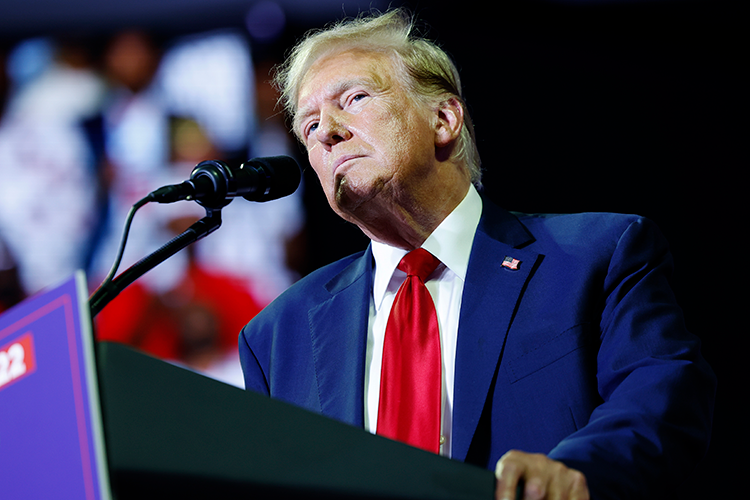Law Firms
What pro bono is BigLaw providing under Trump deals? Trade deals get help but not some conservative causes

Some law firms that reached pro bono deals with President Donald Trump appear reluctant to take on some conservative causes, and in some instances, they are taking cases adverse to the administration, according to news reports. (Photo by Anna Moneymaker/Getty Images)
Some law firms that reached pro bono deals with President Donald Trump appear reluctant to take on some conservative causes, and in some instances, they are taking cases adverse to the administration, according to news reports.
Nearly five months after BigLaw firms began reaching the pro bono deals, “there’s little outward sign that the agreements have impacted their business operations,” Bloomberg Law reports.
The deals required nine firms to provide $940 million collectively in pro bono help toward causes supported by Trump to avoid punitive executive orders. Much of what is known about the deals “is essentially written on the back of a digital napkin, contributing to the uneven delivery,” the Wall Street Journal reports.
Bloomberg Law reports that at least some of the deals weren’t signed. They don’t impose deadlines and don’t include an enforcement mechanism.
Both articles noted that four other firms have so far successfully challenged punitive executive orders. The rulings “likely tamped down any sense of urgency” by the dealing firms, Bloomberg Law says.
The Wall Street Journal says these potential avenues for pro bono mostly didn’t materialize:
• Legal help for police officers accused of misconduct. BigLaw firms haven’t volunteered, according to Devin Barrington-Ward, a spokesman for the National Police Accountability Project.
• Help for conservative causes as requested by the Oversight Project, a conservative watchdog group formerly affiliated with the Heritage Foundation, a conservative think tank. Most firms didn’t respond when contacted, said the group’s president, Mike Howell.
• Pro bono assistance for the Brooklyn district attorney’s office in New York City, as suggested by Cadwalader, Wickersham & Taft global litigation co-chair Nick Gravante. The firm did not contact the office, according to a district attorney spokesperson.
The U.S. Department of Commerce is receiving assistance, however, according to a spokesperson. The department is working with “some of America’s top law firms and legal minds to cement the truly historic trade deals that President Trump negotiated for the American people,” the spokesperson said.
One firm reportedly working on trade deals is Kirkland & Ellis, according to the articles and a report in the New York Times.
Bloomberg Law reports that some of the nine firms “have continued to take the kinds of cases that appear to have made them targets in the first place.”
One example cited by Bloomberg Law is Milbank partners’ involvement in litigation challenging Trump’s tariffs and defending two New Jersey cities in Trump administration challenges to their immigration policies. Another example is a lawsuit filed by Paul, Weiss, Rifkind, Wharton & Garrison against the Proud Boys, a right-wing group, and its leader alleging infringement of trademarks awarded to a church vandalized by Proud Boys members.
But leaders for public-interest nonprofits who spoke with the Wall Street Journal said some BigLaw firms are ignoring their phone calls, even when the firms provided pro bono assistance in the past.
Hat tip to How Appealing, which provided the link to the Wall Street Journal article.
Write a letter to the editor, share a story tip or update, or report an error.

